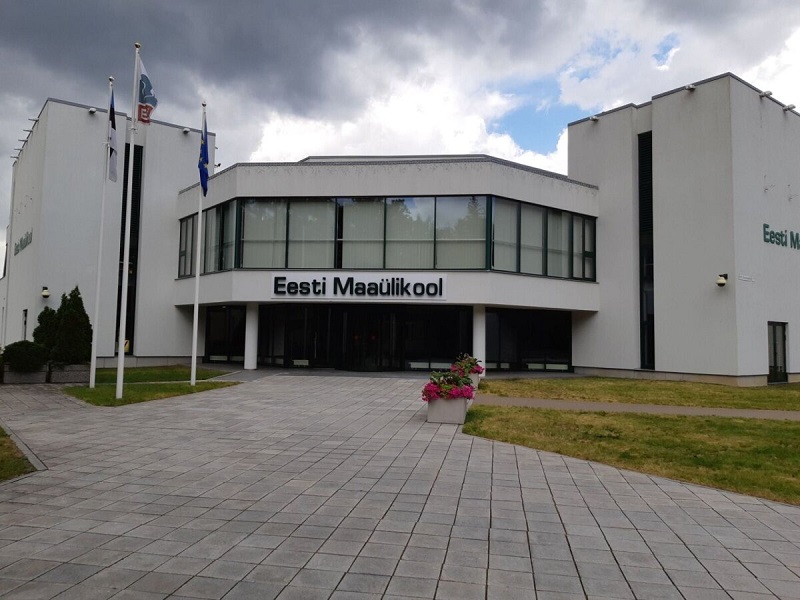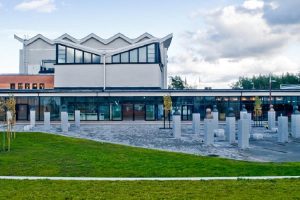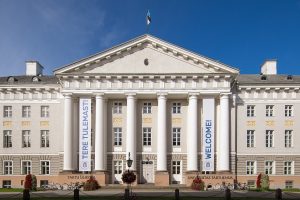
Estonian University of Life Sciences
The Estonian University of Life Sciences is a public university located in Tartu, Estonia, Founded in 1951 and is one of the oldest and most prestigious institutions of higher education in Estonia. In 1999, it was renamed the Estonian Agricultural University, and in 2005 it took on its current name of Estonian University of Life Sciences. The main campus is situated in Tartu, the second-largest city in Estonia, which is known as the intellectual and cultural center of the country. The university has several other facilities and research stations located across Estonia, allowing it to carry out field research and practical training in diverse environments.
The university specializes in life sciences, agriculture, forestry, veterinary medicine, and related fields. It is known for its strong research programs in areas like sustainable agriculture, environmental protection, and animal health.
In 2023, the university had around 5,500 students enrolled across its various bachelor’s, master’s, and doctoral programs. It attracts students not just from Estonia but also internationally, with around 15% of the student body coming from other countries. The Estonian University of Life Sciences is consistently ranked as one of the top universities in Estonia and has a strong reputation both nationally and regionally in Northern Europe for its high-quality education and research.

Research
The Estonian University of Life Sciences has established several renowned research centers and institutes, (Centre for Ecological Engineering, focusing on sustainable solutions for environmental challenges ), the Institute of Technology ( conducting research in areas like precision agriculture and biomass processing)Estonian Crop Research Institute, (engaged in plant breeding and variety development)
The university’s researchers have made significant contributions in areas like Developing innovative precision farming technologies and decision support systems, Advancing biobased and circular economy solutions in the forestry and agricultural sectors, and Improving animal health, welfare, and productivity through biotechnology and genetic research and exploring the impacts of climate change on ecosystems and developing adaptation strategies
Focus Areas
The university has established several nationally and internationally recognized research centers and institutes that serve as hubs for multidisciplinary collaboration and innovation.
Some of the university’s key research focus areas are
- Sustainable agriculture and food systems
- Forestry, wood science, and biobased materials
- Environmental and ecosystem management
- Animal health, welfare, and biotechnology
- Renewable energy and circular economy
- Rural development and entrepreneurship
The university’s researchers have made significant contributions to advancing scientific knowledge and developing practical solutions in these domains.
Research Funding and Collaborations:
The Estonian University of Life Sciences is successful in securing competitive research grants and funding from national and international sources, such as:
Estonian Research Council
European Union’s Horizon Europe and other framework programs
Private sector partners and industry associations
The university actively engages in collaborative research projects with universities, research institutes, and industry partners across Estonia, Europe, and globally.
These collaborations enable the university to leverage complementary expertise, access cutting-edge research infrastructure, and amplify the impact of its research endeavors.
Research Outputs and Recognition:
The university’s researchers have a strong track record of publishing their findings in high-impact peer-reviewed journals, contributing to the advancement of scientific knowledge in their respective fields.
The university’s research output has been recognized through numerous awards, honors, and accolades received by its faculty and researchers.
The university’s research has also led to the development of innovative technologies, products, and services, which have been patented and commercialized through spin-off companies and technology transfer initiatives.
Several of the university’s research projects have been featured in prestigious international conferences, exhibitions, and media outlets, showcasing the relevance and societal impact of its work.
Doctoral Studies and Research Training:
The Estonian University of Life Sciences offers robust doctoral programs across its faculties, providing aspiring researchers with opportunities to pursue cutting-edge research and contribute to the advancement of their respective fields.
Doctoral students at the university benefit from close mentorship by experienced faculty, access to state-of-the-art research facilities, and participation in international research networks and collaborations.
The university’s doctoral programs emphasize the development of critical thinking, independent research skills, and transferable competencies, preparing graduates for diverse career paths in academia, industry, and the public sector.
Many of the university’s doctoral alumni have gone on to become successful researchers, professors, and leaders in their respective domains, both within Estonia and internationally.
Campus and Facilities
The university’s main campus in Tartu features modern, well-equipped facilities, including lecture halls, research laboratories, libraries, and student dormitories. It has state-of-the-art research infrastructure, such as specialized labs for food technology, biotechnology, and veterinary diagnostics.
The university also operates several experimental farms, forests, and other field sites around Estonia, which serve as living laboratories for students and researchers. The university’s library system provides access to a vast collection of print and digital resources, spanning the life sciences and related disciplines.
The campus boasts a vibrant and inclusive community, with students from diverse backgrounds and nationalities. There are over 70 student organizations and clubs, covering a wide range of academic, cultural, sports, and recreational activities. The university encourages student involvement in decision-making processes, with various student councils and governing bodies.
Student housing options include modern dormitories and apartments, fostering a sense of community and independence. The campus provides ample opportunities for sports and leisure, with facilities like gyms, sports fields, and outdoor recreational areas. The university also organizes various cultural events, festivals, and social gatherings throughout the academic year.
The university has several bachelor’s degree programs that are fully taught in English, including in fields like computer science, business administration, and environmental technology.
Many of the English-taught undergraduate programs are interdisciplinary in nature, combining subjects like engineering, economics, and information technology.
Admission requirement
The Estonian University of Life Sciences has the following key admission requirements for international students applying to its English-taught programs:
Educational Background
- Applicants must hold a recognized bachelor’s degree (or equivalent) in a relevant field of study, depending on the chosen program.
- For graduate programs, a minimum GPA of 3.0 (or equivalent) is typically required.
- Applicants must provide official transcripts and diplomas from their previous educational institutions.
Language Proficiency:
- Applicants are required to demonstrate proficiency in the English language.
- Acceptable English language tests and minimum scores include
- IELTS: 6.5 overall (with no section below 5.5)
- TOEFL iBT: 90 overall (with a minimum of 20 in each section)
- Cambridge English: Proficiency (CPE) or Advanced (CAE) with a minimum score of 180
- Native English speakers or applicants who have completed their previous degree in English may be exempted from providing an English language test.
Application Materials
- Completed application form
- Certified copies of academic transcripts and diplomas
- Proof of English language proficiency (as mentioned above)
- Curriculum vitae (CV) or resume
- Motivation letter/statement of purpose
- Two letters of recommendation from academic or professional references
- Copy of valid passport or ID card
Application Deadlines
The university has two main application deadlines:
- 15th January for the Fall (Autumn) semester
- 15th August for the Spring semester
Admission Process
Applications are reviewed by the respective faculty/program admissions committee.
Successful applicants will receive an official letter of admission from the university.
Admitted students must confirm their acceptance and pay the tuition fee deposit to secure their place.
Scholarships and Financial Aid
The university offers a limited number of scholarship opportunities for international students, based on academic merit and financial need.
Applicants are encouraged to explore external scholarship programs and funding sources as well.


